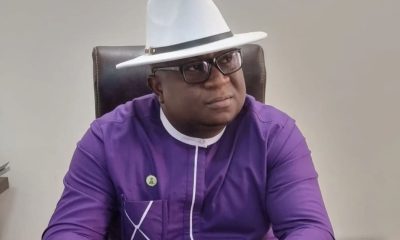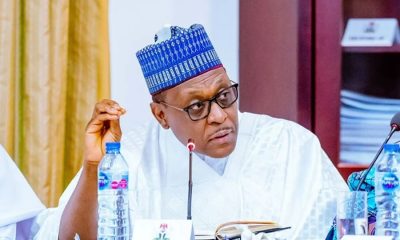Opinion
Why Nigeria and others must not sign the LGBT agreement
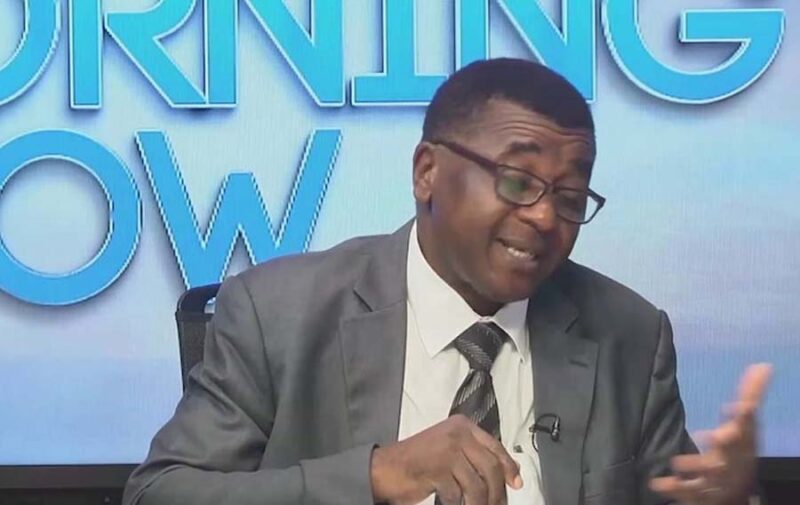
Why Nigeria and others must not sign the LGBT agreement
NOVEMBER 15, 2023, might be a tragic day for Africa and the entire Caribbean and Pacific region. It is the day set aside by the European Union (EU) to pressure or coax African, Caribbean, and Pacific (ACP) countries into signing the deceptively and euphemistically crafted LGBT agreement between the EU and ACP countries. You may be well aware that over the past few months, several meetings have been convened between the EU and ACP parliamentarians aimed at getting ACP leaders to sign the controversial LGBT agreement. For example, a crucial meeting between the EU and ACP Ministers took place in Brussels on November 28, 2022, to potentially exert greater pressure on ACP Ministers to persuade ACP heads of governments to sign the contentious LGBT agreement. Another meeting with the same objective took place from June 19 to 28, 2023, in Brussels. The aforementioned meetings ended in a deadlock as ACP parliamentarians and leaders vehemently opposed the signing of the LGBT agreement. This is why we are shocked to hear today that November 15 has been scheduled for signing the offensive LGBT agreement. The pertinent questions are: Have ACP heads of government compromised their earlier stance on this matter and now agreed to sign the controversial LGBT agreement? If so, why? Did African leaders consult their respective parliaments and their people before agreeing to sign the agreement? Why is the African media not reporting the LGBT negotiations between the EU and the ACP countries since 2021?
One thing is certain. If the ACP governments succumb to the EU’s intimidation and sign the LGBT agreement, it will spell doom for the ACP countries. Why? Because the agreement is primarily aimed at the homosexualization and LGBTization of ACP countries. This agreement, which takes the form of a treaty, is deceptively and deviously worded to impose the EU’s LGBT agenda on ACP countries. This is why ACP countries must unanimously rise up and resist the signing of this agreement. Why? Because once the agreement is signed, it shall automatically override their Constitutions and national sovereignty of the ACP countries. In contrast to the Monroe Doctrine, Nigeria operates the Dualist doctrine under international law. Consequently, by virtue of section 12 of the 1999 Nigerian Constitution, a treaty signed by Nigerian political leaders does not have the force of law in Nigeria until it is ratified and domesticated by the National Assembly. However, the LGBT agreement has been so craftily worded that once signed by Nigeria and the ACP countries, the agreement automatically supersedes their respective domestic laws and establishes LGBT as their new law.
READ ALSO:
- Israel killing innocent children in Gaza without justification – Brazil president
- Just in: Police confirm killer of Lagos street sweepers surrenders
- Tinubu inherited empty treasury from Buhari – Nuhu Ribadu
It is unbelievable that the West has elevated the barbaric act of inserting a penis into the anus or fingers into the vagina as a civilizational value. The anus is meant for waste elimination; waste comes out from the anus. However, today, the West is trying to teach us the opposite. Regrettably, the West is attempting to convince us that engaging in anal intercourse is a form of statecraft that supersedes more important matters.
As far as the EU, the U.S., and many parts of Europe are concerned, any country not endorsing the practice of inserting a penis into the rectum is seen as not fulfilling its international obligations. The LGBT countries may appear as stars that reflect light, yet they are waterless clouds carried away by the winds of eroticism, uprooted and twice dead. They resemble fruitless trees in late autumn or wild waves of the sea, casting off the foams of their vomit in public. What a shame! Where has public shame gone?
For example, U.S. President Joe Biden has made LGBT rights the centerpiece of American foreign policy. This is why Biden has ordered that the American flag be flown alongside the LGBT+ flag, portraying America as an LGBT-friendly country. The US government is now persecuting Uganda for enacting anti-homosexual laws in Uganda. In his recent remarks, Biden has claimed that LGBT rights are universal international law. He does not seem to understand that international law is binding upon the consent of nations. He is unaware that the consensus reached at various United Nations Conferences is that the laws passed in every developing country, including Nigeria and other African nations, must reflect the diverse social, economic, and environmental conditions of the country, while respecting their religious, cultural backgrounds, and philosophical convictions.
Therefore, Nigeria should not sign the LGBT agreement on November 15 or at any other time. The same applies to other African, Caribbean, and Pacific countries. Instead of succumbing to the EU’s veiled intimidation and blackmail to sign the agreement, they should assert their sovereignty and walk out on the EU on November 15. Nigeria is a sovereign country, as are other African nations, the Caribbean, and the Pacific countries. We should not be dictated to by the EU. We are no longer under the tutelage of our former colonial masters. If the EU decides to stop providing financial assistance due to our refusal to sign the LGBT agreement, they may proceed to do so. However, we cannot yield to the EU’s cheap blackmail and sign the agreement. In any case, LGBT practices are illegal in Nigeria, and likely in all African countries except South Africa. The concept of same-sex cohabitation or marriage is abhorrent to Nigerian and African sensibilities. Above all, it represents a complete departure from African civilization.
I have recently participated in a conference in London organized by world-class public intellectuals. Renowned psychologist Dr. Jordan Peterson and others who spoke at the conference expressed concern that Western civilization has eroded. Speaker after speaker at the conference lamented that the West has lost its history and culture and emphasized the importance of preserving one’s civilization as a significant investment in this life.
READ ALSO:
- ASUU directs members nationwide to join NLC strike
- Gunmen ambush Benue links passengers, kidnap 13
- Ahead of Appeal Court governorship judgement, Police beef up security in Kano
In the feverish pursuit of LGBT sexual pleasure and slavish freedom, the West has lost its core values and identity. Should African, Caribbean, and Pacific countries join the West in this madness? No, we must stick to our own values and traditions. It is suicidal to import practices and lifestyles that are alien to Africa and seek to impose them as laws, all in the name of observing international obligations. It is obvious that the EU has no respect for the religious and philosophical convictions of the African and Nigerian people; otherwise, it would not have been stampeding us to sign the LGBT agreement. Come to think of it, the EU lacks the locus standi to seek to impose on African countries aberrations that are alien to the lifestyle of the African people. Laws are made in consonance with the values of a people. Every country is interested in protecting what it holds dear or its cherished values. The EU has no right to dictate to us the kind of laws we should enact for our people. LGBT is not our value. Gay marriage is not our value. Neither is transgenderism our value. If the West is sinking to the bottomless pit of human civilization with LGBT and transgenderism, it should sink alone; it must not seek to sink together with the African, Pacific, or Caribbean countries.
Happily, at the time of writing, Namibia had pulled out and sworn that it will never sign the LGBT agreement. It is not unlikely that other countries will follow suit and pull out from signing the agreement or signal their intentions to refrain from signing the agreement. In refusing to sign the agreement, Namibia said that the agreement is “not in line with the Namibian Constitution, its legal framework, nor its intended relations and cooperation policy.” It also said that the agreement does not have a definition section to ensure that all parties understand the terms of the agreement and what they entail. According to Namibia, the agreement “refers to a commitment to the full and effective implementation of future outcomes of Beijing and ICPD review Conferences that may bind parties to future processes and outcomes that cannot be predicted at the present moment.” Namibia also complains that the agreement “may elevate non-binding agreements/strategies/initiatives, progress, and processes to a legally binding position or treaty status.
Nigeria should follow the good example of Namibia in this regard and refrain from signing the agreement. Other ACP countries should follow suit. The resolve of Namibia to exercise its national sovereignty and refrain from signing the agreement is praiseworthy. To sign the agreement is tantamount to giving the EU a blank check to fill any amount of money it likes on it and cash it in a bank. Namibia is right. The agreement is a Trojan horse. Apart from LGBT, other provisions of the agreement legalize transgenderism, human capital reduction, and queer behaviorism in a country that signs the agreement. By signing the agreement, a country consents that its children should be taught how to practice “safe”-sex, “safe”-abortion; how to do masturbation, kissing, hugging, penis touching, vagina touching, and how to avoid getting pregnant through sterilization, and so forth, all in the name of sex education or Comprehensive Sexuality Education (CSE). It is obvious that this agreement specifically targets the children of Africa, Caribbean, and Pacific for corruption and destruction. The agreement threatens to undermine the national sovereignty of the Africa, Caribbean, and Pacific countries that are parties to the agreement. It is targeted at overriding their domestic laws and constitutions as well.
READ ALSO:
- Gunmen invade old Oyo National park, kill one, injure many
- UNIPORT student remanded in prison over murder of girlfriend
- Labour begins nationwide strike today, ignores court order
In the light of the foregoing, the African Parliamentary Forum, in conjunction with African lawyers and some notable African NGOs, organized the first-ever African Inter-Parliamentary Conference on Family Values and Sovereignty in Entebbe, Uganda last year. The conference’s communique later gave birth to what has been christened as the Entebbe Declaration. The Entebbe Declaration has not only unequivocally rejected the LGBT agreement but has also urged the ACP governments not to sign it. Annex 1 of the Declaration states as follows: “WHEREAS the ACP-EU treaty’s supremacy clause invalidates provisions in any existing treaty with which it conflicts, thereby also violating the national sovereignty of countries and the integrity of regional and sub-regional bodies, including the African Union and the integration of regional economic communities. WHEREAS the ACP-EU treaty violates cultural and religious values and undermines the integrity of African family values by mandating the implementation of sexual and reproductive health services and “Sexual and reproductive health and rights” (SRHR), deceptively requiring the legalization of abortion, prostitution, same-sex marriage, special LGBT “rights,” and child sexualization. THEREFORE, we collectively urge all heads of African ACP States not to sign the ACP-EU Partnership Agreement and urge their respective parliaments and legislatures, which are the national law-making bodies of African States, to refuse to ratify this deceptive treaty.”
In conclusion, the EU should leave ACP countries alone in this LGBT matter. Life is about living and letting live. The EU should allow ACP countries to make their own decisions. Practices like LGBT lifestyles cannot be referred to as “human rights”; otherwise, deviant behaviors such as embezzlement of public funds, graft, scams, murder, theft, terrorist attacks, human trafficking, and so forth could also be referred to as “human rights.” You may be aware that as far back as June 29, 2016, the prestigious and highly esteemed European Court of Human Rights, sitting in Strasbourg, France, delivered a historic and unimpeachable judgment that LGBTQ+ is not a human right. The court, which is the highest court in Europe, held that “marriages” entered into by people of the same sex cannot be considered as marriages. As important as this judgment is, the liberal media, such as pro-gay CNN or pro-gay BBC, and others refused to report it.
Therefore, following the good example of Namibia, Nigeria, and the other ACP countries, we must not sign the LGBT agreement. The truth remains that when democracies lose their constituting philosophical and legal principles—when wrongs are described as “rights,” and the tools of law are deployed to do and justify evil—democracies metamorphose into LGBT totalitarianism.
***Sonnie Ekwowusi is the chairman, Human & Constitutional Rights Committee, African Bar Association.
Why Nigeria and others must not sign the LGBT agreement
Opinion
Farooq Kperogi: Selective outrage over mass murders in Nigeria

Farooq Kperogi: Selective outrage over mass murders in Nigeria
When vigilantes incinerated traveling Hausa hunters in Uromi, Edo State, on the mistaken assumption that they were “Fulani herdsmen,” countless Hausaphone Muslim northerners sent the videos to me with commentaries that reeked of unappeasable wrath.
Because there is a 6- to 5-hour time difference between Atlanta and Nigeria, some of the people who shared the videos with me became noticeably impatient with the perceived delay in my response.
Frustrated by the lag in my intervention, they sent messages reminding me of my swift and impassioned condemnation of the May 2022 murder of Deborah Yakubu in Sokoto. They wondered aloud why, unlike my immediate reaction to that previous incident, I had not yet commented on these recent videos.
A few even recalled my January 1, 2011, column titled “Jos bombings: Can we for once be truthful?” where I denounced, in the strongest terms possible, the mass massacre of Jos Christians by a group that called itself Jama’atu Ahlus Sunnah Lid Da’awati Wal Jihad. (I’ve just been made aware of a similar mass murder in Plateau recently. I could republish my 2011 column, and most people won’t notice that it’s a 14-year-old piece except for some names).
Of course, they never reminded me of my swift, full-throated denunciation of the February 1, 2018, murder and burning of 7 innocent Fulani cattle herders in Benue “by people who have been programmed to associate criminality with all Fulani cattle herders,” as I pointed out in my February 10, 2018, column titled “News Media’s Cultivation of ‘Fulani Herdsmen’ Hysteria.”
The people who were impatient with me implied that I was deliberately courting the approval of Christians. In their view, this meant I was seeking validation or favor from the Christian community, possibly at the expense of my own religious identity.
Essentially, they accused me of prioritizing external validation over internal solidarity, implying a certain negligence or disregard for the sentiments and expectations of my own religious community.
Nonetheless, since the publication of my March 29 column, titled “Barbaric Mass Burning of Innocents in Edo,” scores of Christians routinely tag me to mass murders committed by Muslims against Christians and challenge me to objurgate them with the same passion as I did the Edo mass incineration.
READ ALSO:
- Ibadan Pastor ends 30-year-marriage over sex dispute with wife
- BREAKING: Protest in Rivers over emergency rule [VIDEO]
- Ekiti govt engages Muslim leaders after Mosque demolition tension
It seems to me that public commentators unfairly shoulder a burden of intervention that should properly belong to people in positions of authority. Too often, it falls upon commentators to address and amplify crises, even though their roles are fundamentally different from those who wield executive power and influence.
Writing about the horrendous human tragedies that have increasingly become the signature of our national life in Nigeria imposes tremendous mental strain on me. It is emotionally draining and psychologically taxing to continually engage with, dissect, and articulate these disturbing events.
Nonetheless, I deeply understand the reasons behind distraught citizens’ desire to have their anguish acknowledged and amplified by individuals they perceive as having sizable platforms. They turn to public commentators because of their frustration with those in authority, who are perceived as detached, indifferent, or ineffective in responding adequately to their suffering.
Most importantly, though, our outrage toward mass murders often seems conditioned by whether the perpetrators differ from us in identity or affiliation. During Muhammadu Buhari’s presidency, for instance, I faced vicious personal attacks from northern Muslims for drawing attention to Boko Haram’s relentless massacres of Muslims in the North, massacres that many preferred to overlook.
Similarly, bandits in the North have consistently burned, slaughtered, and dismembered their victims, yet these atrocities rarely provoke widespread indignation or inspire righteous anger. Because the victims do not fit the narrative of northern Muslims being victimized by (southern) Christian aggressors, their suffering is met with muted concern at best and outright indifference at worst rather than outrage or vigorous outcry for intervention.
This dynamic is not unique to the Muslim North. In the Christian North, numerous lives are frequently lost in inter-ethnic communal violence. In these cases, however, both the victims and perpetrators typically share a common Christian identity.
As a result, the collective sense of hurt and urgency felt by communities within these areas is markedly diminished. The outrage and intensity of grief that would typically accompany violence perpetrated by Muslims against Christian communities is notably absent, which reflects how religious identities powerfully shape public empathy and indignation.
In the southeast, so-called unknown gunmen perpetrate shocking acts of brutality, including gruesome murders, against fellow Igbo people. But there is rarely any pressure or expectation placed upon commentators like me to amplify these events publicly or to demand action from authorities.
This selective silence, this inconsistency in how acts of violence are perceived and responded to, this tendency for our outrage to be contingent upon the identity dynamics between victims and perpetrators, is an instinctive, age-old, even evolutionary human trait about which psychologists and philosophers have written.
For example in their Social Identity Theory formulation, Henri Tajfel and John Turner assert that we derive our sense of self from our membership of collective identities, and that attack on the collective triggers an intense emotional response but that intra-group violence, though troubling, is psychologically processed as an internal issue and thus evokes less public rage.
READ ALSO:
- Kemi Olunloyo angry, disowns family after father’s death
- Amnesty Int’l slams NBC over ban of Eedris Abdulkareem’s song
- Defamation: Falana urges Akpabio to sue without involving police
From the standpoint of evolutionary biology, we are hardwired to depend on group cohesion and cooperation and to be suspicious of outsiders. Thus, violence perpetrated by out-groups is perceived as a threat to group resources or status, which invokes defensive anger and intolerance.
Emmanuel Levinas and Richard Rorty have also written about the moral burden of “othering,” which refers to the process through which out-group members are mentally constructed as fundamentally incompatible or as morally deficient, thus deserving harsher judgment or reduced moral consideration.
The moral distance created by “othering” leads people to interpret out-group violence as evidence of moral depravity or inherent hostility. The result is that out-group violence elicits intense moral condemnation. Conversely, violence within the in-group, involving individuals perceived as morally closer, is more readily explained away, forgiven, or rationalized.
In communication scholarship, we also talk of selective perception. It is an instinctive cognitive bias that predisposes us to perceive reality in ways that reinforce and soothe our predetermined prejudices.
Related concepts are selective exposure (the tendency to see only those things that affirm our pre-set biases and to block out those that cause us cognitive dissonance) and selective retention (the tendency to remember only those things that confer psychic comfort to our sentiments and to forget those that don’t fit that frame).
We are more tolerant of and readier to justify hurtful words that come from our “friends” than we are of even less hurtful words that come from our “enemies.”
Psychologists who study cognitive biases point out that our default positions as humans is to support our kind, to selectively expose ourselves to and perceive, even retain, only those points of views and perspectives that reinforce our prejudices.
It’s often an unconscious process. And so, it takes nothing to be prejudiced. It’s effortless. What isn’t effortless is the capacity for conscious distancing, for dispassionate reflection, and for self-criticism.
It takes self-reflexivity and self-awareness to rise superior to the default impulses that so readily and so easily crowd and becloud our minds in moments of emotional tension. Very few are capable of this, and that’s why some people question the practical utility of the idea of deliberative democracy—the idea of government by rational conversation.
Because this is not unique to Nigeria, I hope humans can evolve to the point where we transcend these troubling predispositions.
Farooq Kperogi: Selective outrage over mass murders in Nigeria
Farooq Kperogi is renowned columnist and United States-based Professor of Journalism
Opinion
Tinubu, Atiku, and Argentina: United by pain, divided by rhetoric, By Farooq Kperogi

Tinubu, Atiku, and Argentina: United by pain, divided by rhetoric, By Farooq Kperogi
President Bola Tinubu’s Senior Special Assistant on Social Media by the name of Dada Olusegun reportedly said on Thursday that had Nigerians elected former Vice President Atiku Abubakar as president, they would have been sweltering in the same snake pit of torment and economic decline as Argentinians are.
Olusegun’s comment was informed by Atiku’s previous praise for Argentinian President Javier Milei’s economic reforms on February 25, 2024, when Atiku had encouraged Tinubu to emulate the Argentine model.
“Reports have shown how Argentina’s real economy which Alhaji Atiku wants Nigeria to emulate is in severe crisis,” he was quoted to have written on Twitter. “Public debts have reached new highs with the country owing more to the IMF than any other country in the world. Meanwhile, its education sector, manufacturing and construction are collapsing amid rapid deindustrialization. Argentina has $41 billion in credit outstanding, representing 28% of all debt owed to the Fund.”
It’s interesting that the presidential aide painted a dystopian vision of Nigeria’s fate under an Atiku Abubakar presidency by invoking the existential turmoil gripping Argentina under Javier Milei. Yet, delicious irony hums beneath the surface, unseen by Olusegun. President Tinubu’s own economic prescriptions mirror Milei’s policies so closely they might as well be fraternal twins.
Both Tinubu and Milei are champions of punishing austerity. Both are architects of spiraling inflation and social distress. But as the presidential aide warned Nigerians against the imagined peril of emulating Argentina, he entirely missed the reflection staring back from his own political mirror.
He seems blissfully unaware that his cautionary tale is already Nigeria’s lived reality, which is dramatized in the daily hardships and grievances of citizens enduring a spectacle not different from Milei’s Argentina.
In my March 9, 2024, column titled “Rise of Right-wing Economic Populism in Nigeria,” where I tackled Atiku for prescribing Argentina as a model for Nigeria,’ I wrote the following, which is still relevant today:
“Everyone within striking distance of becoming president in Nigeria in 2023 subscribed—and still subscribes—to the consensus that the IMF and the World Bank are inviolable economic oracles that must not be disobeyed, that subsidies must be eliminated and the poor be left to fend for themselves, and that the market is supreme and should be left to determine the value of everything.
READ ALSO:
- Chinese man found with fake diplomatic number plate in Lagos
- Akpabio to sue Natasha for alleged assassination attempt
- Oyo PDP chieftain Adeojo dies, Makinde mourns
“In fact, the other day, PDP presidential candidate Atiku Abubakar put out a press statement titled ‘Argentina’s Javier Milei approach to reforms should serve as a lesson for Tinubu’ where he extolled the dangerously right-wing Argentinian president Javier Milei whose rightwing economic populist policies are destroying the fabric of his country.
“‘I read a recent report in Reuters titled: “Argentina’s market double down on Milei as investors ‘start to believe”,’ he wrote.
“Well, the same Western financial establishment is already praising the outcome of Tinubu’s economic policies. A March 8, 2024, report from Bloomberg, for instance, has said that ‘Foreign investor demand for Nigerian assets surges as reforms instituted by President Bola Tinubu’s administration starts paying off.’
“Similarly, one David Roberts, identified as a former British Council Director in Abuja, bragged the other day that Nigeria’s economy ‘posted a GDP growth of 3.46% in quarter 4’ as a result of Tinubu’s economic reforms.
“He wrote: ‘Why would a country with a severe infrastructural deficit invest more money on a wasteful expenditure such as cheap petrol, instead of building schools, hospitals, dams and a national railway system? It is evident that it had to go.
‘We joined the World Bank and the International Monetary Fund in saying as much to the Nigerian government. And at long last, it is gone.’
“People outside Nigeria reading about Nigeria in the Western financial press would think Nigerians are now living in El- Dorado as a result of Tinubu’s ‘reforms’—just like Atiku thinks a favorable Reuters story about the anti-people economic policies of Milei, who is called the ‘Madman of Argentina,’ is already yielding excellent outcomes.
“If you do the bidding of the Western establishment, they will always make up statistics to show that your economy has grown. I called attention to this in my June 28, 2023, column titled, ‘Why Tinubu’s Hiring and Firing Frenzy Excites Nigerians.
“I wrote: ‘What shall it profit a country when it pursues policies that cause the economy to ‘grow’ but cause the people to growl? After the economy has ‘grown’ but the people still groan, where is the growth? The most important growth isn’t the rise in abstract, disembodied, World Bank/IMF-created metrics but in the improvement of the quality of life of everyday folks.’
“Milei’s Argentina that Atiku is praising is almost in the same right-wing economic hellscape as Nigeria is. Like Tinubu, Milei began his presidency by removing subsidies for petrol and transportation and devaluing the Argentinian peso by more than 50 percent. In addition, he threw scores of workers into unemployment when he reduced the number of ministries in the country.
READ ALSO:
- Bayelsa govt gets court order to stop pro-Wike rally
- Outgone Corps members will get minimum allowance arrears – NYSC
- Natasha dares Akpabio to sue her for exposing assassination plot
“He is so market-centric he scrapped a whole host of rules designed to reign in the greed and exploitation of private enterprises. He did this by getting the parliament to approve the principle of ‘delegated powers’ to the executive for one year, which allows him to rule by decree like a military dictator in the name of ‘economic urgency.’
“The result? Like in Nigeria, most Argentinians are having a hard time finding food to eat. A February 1, 2024, CNN story captures it: “‘I don’t know how I will eat.’ For the workers behind Argentina’s national drink, Milei’s reforms are turning sour.”
“Argentinian workers periodically go on strike to protest Milei’s punishing right-wing policies. On February 28, all flights were cancelled in the country because air travel workers went on a crippling 24-hour strike.
“A March 4, 2024, Bloomberg report said Milei’s policies had caused spending to plunge at shops in Argentina, that firms were seeing double-digit sales declines for third straight month, that the worth of salaries had plummeted amid a paralyzing 250% inflation, and that recession was deepening in the country.
“The lead to the story says it all: ‘Consumers in Argentina are running out of options to shield themselves from runaway price increases as President Javier Milei’s austerity measures send the country deeper into recession.’
“That’s Atiku’s exemplar for Nigeria. Peter Obi is, of course, no different. Tinubu, Atiku, Obi, and in fact Yemi Osinbajo are united in their love for rightwing economics, which invariably leads to an increase in poverty, suffocation of workers, rolling back of welfare for common people, etc.
“In a perverse way, they are actually worse than Buhari because they are self-conscious conservative economic ideologues. Buhari is merely a know-nothing, bungling, kakistocratic power monger.
READ ALSO:
- Fraud rocks FIRS, court orders final forfeiture of Abuja, Kano houses linked to official
- Your time is almost up, military tells notorious bandit leader Turji
- Police recover body of Delta site engineer killed, buried by employees
“The real tragedy is that the vast majority of Nigerians who are ensconced in the narrow ethno-religious political silos built around the personalities of the major 2023 presidential candidates don’t realize that on economic policies, which is what really matters, Tinubu, Atiku, Obi, and Osinbajo are more alike than unlike.
“Sadly, Nigerian leftists, who used to be the bulwark against the dangers of conservative economic totalitarianism, have either been coopted or silenced. Only Femi Falana, Majeed Dahiru, I, and a few others consistently stand up to the forces of economic conservatism.
“This state of affairs will ensure that Tinubu’s successor will be another neoliberal ideologue who will bludgeon his way to the presidency using religion and ethnicity as cudgels. When he deepens the misery he inherits, he will blame his predecessor for not being a faithful practitioner of the neoliberal gospel. His own successor will replicate his template.
“After three terms of this right-wing baloney, Nigeria will be irretrievably gone. The time to pivot from the IMF and the World Bank and to reject everyone who is their poodle is now.”
Because Tinubu’s presidential aide is shielded from the biting aftermath of his principal’s cruel economic policies, he imagines that Nigeria is different from Argentina. He is deluded. He lives in an alternate, sequestered reality.
Just as Tinubu’s swift removal of petrol subsidy and his devaluation of the naira set off inflationary shockwaves that hit millions of households in Nigeria, Milei’s shock therapy, which also involves subsidy cuts, currency plunge, and fiscal austerity, has exacerbated hyperinflation and unemployment, caused more than half the population to teeter below the poverty line, and provoked social unrest.
In both Nigeria and Argentina, the middle class has been squeezed: many who were managing to live decent lives have slid backwards because soaring prices and job losses, undermining the very social fabric needed for a stable economy. Tinubu’s Nigeria and Milei’s Argentina present a distinction without a difference.
Tinubu, Atiku, and Argentina: United by pain, divided by rhetoric, By Farooq Kperogi
Farooq Kperogi is a renowned columnist and United States-based Professor of Journalism.
Opinion
How Wande Abimbola rejected IBB’s ING bait, and other stories (3)

How Wande Abimbola rejected IBB’s ING bait, and other stories (3)
Tunde Odesola
(Published in The PUNCH, on Friday, April 4, 2025)
Abimbola’s eyes had seen 999 battles; so, one more battle would not make him go blind. Having survived a milestone of battles, it was natural for Abimbola to deploy his greatest weapon, Ifa, to prosecute the students’ battle that raged during his tenure as vice-chancellor of the University of Ife.
The Babalawo’s eyes had seen many òkun (oceans) and countless òsà (lagoons), so he would not panic at the sight of isún (springs). Wande had fought many wars, yet he remained unbowed, standing on the rock of truth.
In the military years of the 1980s, vice-chancellors of federal universities were statutorily entitled to a first term of four years and, if reappointed, got a three-year second term.
In Abimbola’s seven years of vice-chancellorship (1982-1989), Great Ife witnessed giant strides, such as the purchase of a $1.2bn first-in-Africa accelerator for nuclear research energy and medicine – bought from France in 1986; establishment of 23 linkages with various world-class citadels of knowledge, maintaining peace and tranquility among staff and students, and supporting teaching, research and development.
“The university had a bank account in New York and an office in the UK, manned by whites. When an official of the university visited a university in the UK or our students went for exchange programmes, they– white officials employed by Ife– were the ones who saw to protocols, arranging for hotels, etc. It was a liaison office where those inquiring about our university could go and make inquiries. We had lots of money in the university’s accounts in the UK and New York City.
“But, in line with a Federal Government directive that later emerged and forbade public institutions from running foreign accounts, Education Minister, Prof Jubril Aminu, said we should close down the account and all the money in the account was moved through the education ministry to Federal Government’s account in 1986,” Abimbola said.
READ ALSO:
- South African court acquits Nigerian pastor of rape after 8 years in jail
- Man jailed 3 months for non-declaration of $30,000 at airport
- More heads to roll in NNPCL, subsidiaries as Ojulari assumes office
In the same year, an external battle spilled over to Great Ife when Ife students, in solidarity with their Ahmadu Bello University colleagues, planned to embark on a protest called Ango-Must-Go.
Agronomy expert, Prof Ango Abdullahi, was the vice-chancellor of ABU, whom protesting students accused of callousness, following an increase in school fees, among many other allegations. Abdullahi had reportedly invited the police to quell a peaceful protest, an authoritarian action, which some newspapers said resulted in the rape, maiming and killing of students and non-students by the police.
A slew of Western press, including BBC, Voice of America, The Washington Post, Chicago Tribune, etc. reported in 1986 that many lives were lost to the ABU riot, with Nigerian newspapers lamenting, “Abdullahi expressed no regrets inviting the police,” and that he said, “only four people died.”
Currently, Abdullahi is a Commander of the Order of the Niger (CON deleted) and he holds the Magajin Rafin Zazzau traditional title. He is 86 years old.
Abimbola said, “Higher institution students from all over the country had gathered in our university. They wanted to hold the mother of all rallies because some of their colleagues had been killed by the police in ABU, Zaria.
“Security reports showed that the external students were in their thousands and had joined forces with our student population that numbered up to 30,000 because Moore Plantation, Ibadan; Adeyemi College of Education, Ondo; and the Institute of Agriculture, Akure, were part of UNIFE then.
“The students were charging themselves up all through the night, singing, dancing and drinking, preparatory to a grand protest the next morning. The fear of the unknown gripped the university community because nobody could predict what the external students could do, but we know our students were not destructive.
“I consulted Ifa, and Ifa told me what to do. In the middle of the night called óru ògànjó, I did what Ifa told me to do. Subsequently, loud and strange sounds reverberated through the university, sending shivers down the spines of the students who stopped singing and dancing, with the foreign students fleeing the campus as early as 5 a.m., while our students ceased all protest activities and went back to class. I am a lover of freedom of expression and association, but I could not leave the university community at the mercy of the foreign students, who could have wreaked havoc because they did not know the Ife tradition of protest.”
READ ALSO:
- Barcelona beat Atletico to set up cup final against Real Madrid
- NNPCL hikes petrol pump price to N950/litre
- Liverpool leap closer to title with narrow Everton win
So, I asked Awise Agbaye if African traditional bulletproof could stop AK-47 bullets. “No, it cannot,” Abimbola said. Abimbola’s response was in tandem with the answer given by the Araba of Osogbo, Chief Ifayemi Elebuibon, whom I had asked the same question some time ago.
In my article, “Can African bulletproof stop AK-47 bullets?”, published in The PUNCH, on January 18, 2021, a former Military Administrator of Lagos State, Brigadier-General Olagunsoye Oyinlola, said no African traditional bulletproof can stop bullets from AK-47 rifle, a position which pan-Yoruba activist, Sunday Adeyemo, aka Sunday Igboho, opposed, saying he had ‘authentic’ African traditional bulletproof that could stop AK-47 bullets. The Ooni, Oba Adeyeye Ogunwusi, also said in a telephone interview with me that ‘ayeta’ could stop bullets from an AK-47.
However, Oyinlola, who fought in the Chadian crisis of the 1980s and (also deleted) led Nigeria’s contingent to the United Nations’ peacekeeping mission in Somali in the early 1990s, said, “In the dane guns that masqueraders use in deceiving people, it is the gunpowder in them that explodes, they have removed the balls in the guns. As for soldiers missing their target when shooting at armed robbers tied to stakes, you must realise that it is not easy to kill a fellow human being.
“Some of the soldiers are newly recruited. Some shut their eyes and shoot up. There was a time that the officer commanding the shooting had to kick out one of the soldiers because he was closing his eyes and shooting up. If it was ‘ayeta’ that made bullets not penetrate the robbers’ bodies initially, why did they die eventually?”
Despite being armed, Sunday Igboho and some of his men fled when the democratic dictatorship of former President Muhammadu Buhari sent AK47-wielding killers in DSS uniform after him in his Ibadan home at night, following his strident condemnation of the widespread killing of Yoruba farmers by Fulani herdsmen in the South-West. One of Igboho’s men, who had charms all over his body, was killed and his corpse taken away by the killer DSS men.
READ ALSO:
- Protect vulnerable Nigerians, IMF tells Tinubu
- Ex-NYSC DG Tsiga regains freedom after 56 days in captivity
- Notorious bandit leader Bello Turji goes berserk, kills 12 to celebrates Eid
In an interview with me, Abimbola recalled that French soldiers cut off the charmed bracelets, amulets, gourds and cowries that Nigerian volunteers to WW1 had on their bodies.
Recounting how his father enlisted in WW1, Abimbola said, “ My father was playing ‘ayò olópón’ with six others in Oyo when the town crier came and announced the war. From the ayò game, they all voluntarily went to the palace and were enlisted to fight on the side of France in Cameroon between 1914 and 1916. This was when European allied forces were fighting Germany and taking over Germany-colonised territories worldwide during the fallout of WW1. Germany had colonised portions of Cameroon, which France took over during the war.
“The coalition took back all the African territories controlled by Germany. The countries include Tanganyika, now Tanzania, Rwanda/Burundi, Namibia, Cameroon and Togo. When I went to France in 1986 to purchase the accelerator, I told French authorities that my father fought on the side of France during WW1, they collected my father’s name, and the next day, they came and told me it was true, saying I could apply for French citizenship on account of my father’s participation in the war. But I did not.
“It was my grandfather, Akinsilola, nicknamed Légbejúre (fàdá owó è pa ìjàkùmò), who led Oyo warriors to Ijaye, while Ogunmola led Ibadan warriors to Ijaye during the Ijaye War, and both forces levelled Ijaye. The late Alaaafin, Oba Lamidi Adeyemi, used to recite the panegyrics of the Oyo warriors who went to the Ijaye War, affirming my grandfather’s leadership of the Oyo forces. Unfortunately, I did not document the late Alaafin’s account.”
When the Nigerian Civil War broke out, Abimbola’s father and his younger brother, who also fought in WWI, urged Abimbola to enlist for the war.
“I wished to go. But I was writing my PhD thesis then. If I had completed my PhD, maybe I would have gone to the civil war,” he said.
Extolling moderation, humility, contentment and truth as virtues for longevity, Abimbola said he rejected plots of land someone gifted him in Lagos when he was VC, adding that the only house he owned was his father’s house in Oyo, which he remodelled as advised by his father.
Abimbola, who has 17 children, including three sets of twins, revealed that he never attained the only position he struggled to get, which was the governorship of Oyo State.
“1975 was the last time I drove a car. As VC, I had a total of five cooks and stewards, and there were 18 vehicles in the fleet, including a Peugeot 504 and two Mercedes-Benzes. I never rode the Mercedes-Benz because I knew I could not maintain such a lifestyle after my tenure. I only rode the Peugeot. The 18-car fleet was for the operation of our linkages, too,” Awise said.
* Concluded.
Email: tundeodes2003@yahoo.com
Facebook: @Tunde Odesola
X: @Tunde_Odesola
-
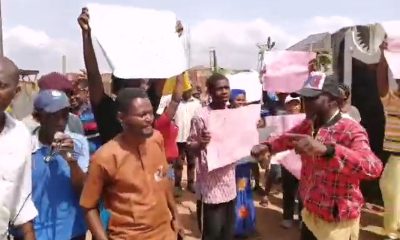
 metro2 days ago
metro2 days agoKidnapping: Our lives are hanging by a thread, residents of Igbogbo-Baiyeku communities in Lagos cry out
-

 International2 days ago
International2 days agoUS announces new visa requirements for Nigerian applicants
-

 International1 day ago
International1 day agoUS embassy announces new visa interview requirements for Nigerian applicants
-

 Sports1 day ago
Sports1 day agoBreaking: Former Super Eagles coach Christian Chukwu passes away at 74
-

 Sports3 days ago
Sports3 days agoCristiano Ronaldo ventures into movie industry, unveils new studio
-
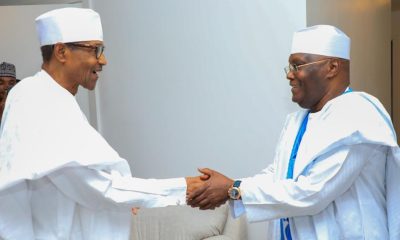
 Politics2 days ago
Politics2 days agoAtiku leads Tambuwal, El-Rufai, others to Buhari as 2027 election draws near
-

 metro2 days ago
metro2 days agoIbadan Pastor ends 30-year-marriage over sex dispute with wife
-

 metro2 days ago
metro2 days agoKemi Olunloyo angry, disowns family after father’s death

